You Don't Need Contentsquare in 2024: Here Are Some Alternatives
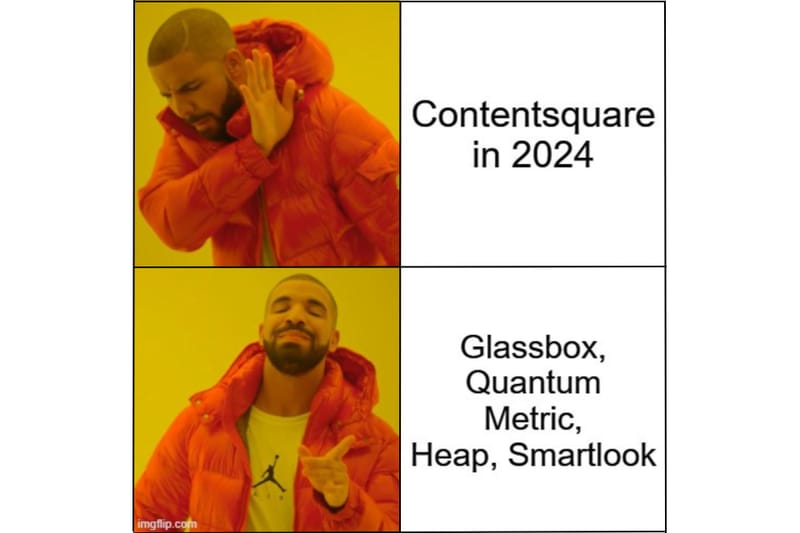
I remember the first time I explored the world of digital experience analytics. The idea of understanding how users interact with a website was mesmerizing.
I was then introduced to Contentsquare, a tool that promised to unravel user behaviors and optimize digital experiences.
However, as I became more seasoned in the industry, I realized that while Contentsquare had its strengths, there weren't other players in the game. In fact, some competitors offered even more robust and simple solutions.
What is a Digital Experience Analytic?
Digital Experience Analytics (DXA) measures and optimizes user interactions with digital platforms, including websites and mobile apps. Key components of DXA include:
- User Behavior Tracking: Captures data on navigation, session durations, and click paths.
- Performance Metrics: Evaluate page load times, responsiveness, and uptime.
- User Feedback and Sentiment Analysis: Gathers direct feedback and analyzes user emotions.
- Conversion and Goal Tracking: Measures how well platforms drive users towards goals.
- Mapping Customer Journey: Maps the entire user journey across touchpoints.
- A/B Testing and Personalization: Compares different versions and tailors content to users.
DXA benefits include enhanced user experience, increased engagement, data-driven decisions, higher conversion rates, and competitive advantage.
DXA can help organizations improve digital experiences, drive user satisfaction, and achieve business growth. It provides actionable insights that inform strategic decisions and help create seamless, easy-to-use interfaces.
The Biggest Competitors and Alternatives to Contentsquare
Here are the top 5 competitors that have emerged as possible replacements to Contentsquare.
Glassbox
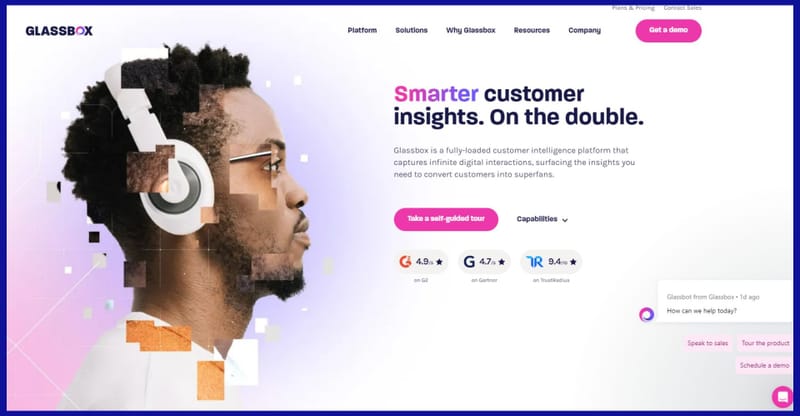
Glassbox was a game-changer for me. I had always found CContentsquare'sinterface somewhat clunky, but Glassbox offered an intuitive and seamless user experience that made my work feel like a breeze.
Their real-time session replay feature is outstanding. It allows you to see exactly what users are doing on your site or app as they happen.
This immediate feedback loop is crucial for quickly identifying and addressing user pain points.
Glassbox also excels in mobile app analytics, an area where Contentsquare sometimes falls short.
Whether you're working with iOS or Android, Glassbox provides deep insights into mobile user behavior, helping you optimize your app for better performance and user engagement.
The platform's AI-driven analytics and machine learning capabilities further enhance its ability to provide important insights.
Key Features:
- Session replay
- AI-driven analytics
- Mobile app analytics
- Intuitive interface
2. Quantum Metric
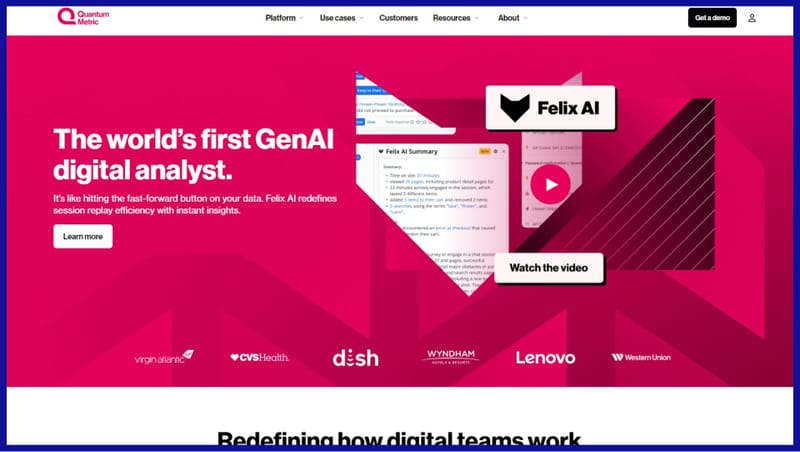
Quantum Metric is another excellent alternative to Contentsquare. I remember being impressed by their comprehensive approach to experience analytics.
Unlike Contentsquare, Quantum Metric offers a robust suite of tools that cover everything from session replay to mapping the journey and optimizing the funnel.
One of Quantum Metric's standout features is its real-time, continuous experience insights. This means you're not just getting periodic snapshots but a constant stream of data that helps you understand interactions in real time.
This is incredibly valuable for making quick, informed decisions.
Their platform also emphasizes customer journey analytics, providing a clear visualization of how users navigate through your site. This helped me identify bottlenecks and optimize the user journey more effectively than I ever could with Contentsquare.
Key Features:
- Continuous experience insights
- Mapping Journey
- Data streams
3. Heap
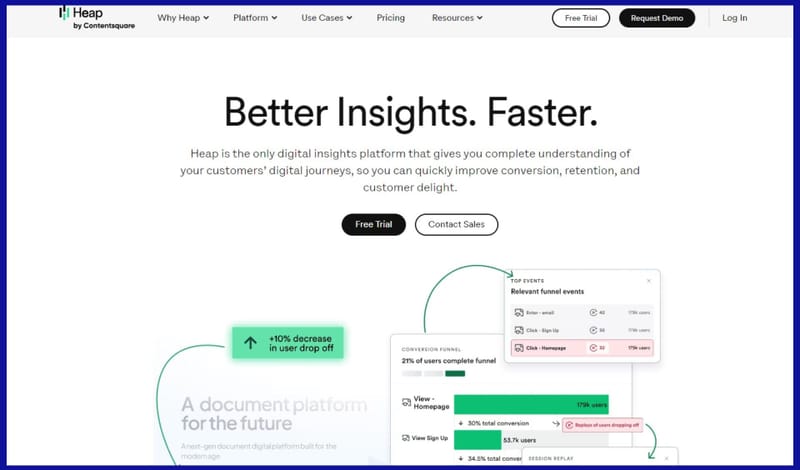
Heap is a fantastic tool for those who prioritize ease of use and robust data capabilities.
I was initially drawn to Heap because of its user-friendly interface and its ability to capture every user interaction without manual tagging automatically. This feature alone saved me countless hours that I would have otherwise spent on setup and maintenance.
The Analytics platform is robust, offering deep insights on user behavior and customer journeys.
The platform's ability to provide real-time data and important insights was a game-changer for me. Moreover, funnel analysis and conversion rate tools helped me streamline processes and significantly improve site performance.
Heap also integrates seamlessly with other tools, making it a versatile choice for businesses that rely on a range of software solutions.
Its integration capabilities ensured that I could easily combine data from multiple sources, providing a holistic view of user interactions and giving one of the best customer experiences.
Key Features:
- Automatic capture of user interactions
- Data and actionable insights
- Funnel analysis and optimizing conversion rate
- Seamless integrations
4. Smartlook
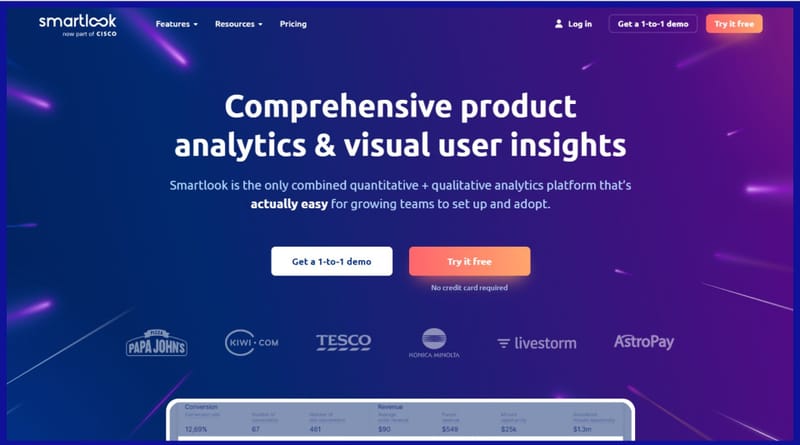
It is another competitor that has gained traction in the digital analytics space.
I appreciated it for its affordability and comprehensive feature set. As someone who has worked with both large enterprises and smaller startups, I found Smartlook to be versatile and scalable.
The platform offers robust session replay, heatmaps, and event tracking, similar to Contentsquare. However,
It stands out with its ability to provide detailed maps of a user's journey and insights into their behavior. Their friendly dashboard made it easy to navigate and extract valuable data.
One of its unique aspects is its focus on usability testing and feedback. This feature helped me gather direct user feedback and understand their pain points more clearly.
It was an invaluable tool for improving the overall experience and ensuring that my website met user expectations.
Key Features:
- Detailed maps of a user's journey
- Robust session replay and heatmaps
- Usability testing and feedback
- User-friendly dashboard
5. Mixpanel
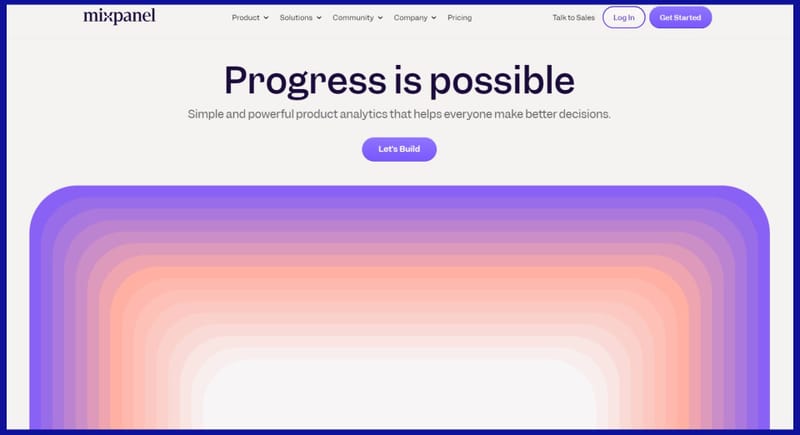
Mixpanel is a powerful analytics tool that offers a unique approach to understanding user behavior.
What drew me to Mixpanel was its focus on data-driven decision-making and its ability to provide granular insights into user interactions.
MMixpanel's advanced analytics platform allows for deep segmentation and cohort analysis, enabling you to track and analyze your behavior over time.
Contentsquare needed to improve this level of detail. Additionally, MMixpanel's interactive interface and real time reporting capabilities made it easy to monitor user trends and make informed decisions quickly.
The platform also excels in customer engagement and retention analysis, providing important insights that help improve the experiences and drive growth.
MMixpanel's integration with various marketing and CRM tools ensured that I had a cohesive view of my data, further enhancing its value.
Key Features:
- Advanced analytics and segmentation
- Cohort analysis
- Reporting
- Customer engagement and retention insights
My Thoughts
While Contentsquare has served as a reliable tool for digital analytics, exploring alternative platforms has highlighted the vast potential for improvement and innovation in this space.
All the tools I've discussed in this blog have unique strengths, offering more interactive interfaces, real-time data, and important insights.
These features can significantly elevate a digital strategy by providing a more profound, more nuanced understanding of your behavior and preferences.
Glassbox excels in capturing and replaying user sessions, which can help identify and rectify user pain points efficiently.
Quantum Metric's real time analytics and continuous feedback loops are invaluable for agile teams needing to pivot quickly based on their behavior. Heap's automatic event tracking simplifies the analytics process, eliminating the need for manual tagging, which can save time and reduce errors.
Smartlook's focus on mobile app analytics and mapping user journey provides detailed insights into mobile behavior. At the same time, Mixpanel's robust data analysis and segmentation capabilities offer powerful tools for targeted marketing and user engagement strategies.
Transitioning from Contentsquare to one of these competitors could open up new horizons of understanding and optimization, potentially revolutionizing the user experience and driving more effective digital strategies.
As digital environments grow more intricate, having the right tools to adapt to and anticipate user needs is crucial for maintaining a competitive edge.
Conclusion
As we move into 2024, it is clear that staying ahead in the digital landscape requires tools that are both powerful and adaptable to users' ever-changing needs.
Whether you seek better mobile app analytics, detailed user journey mapping, or robust insights, these Contentsquare alternatives offer compelling solutions.
If you are looking for the perfect solution for your needs, consider exploring these options. They will improve your user experience and take optimization to new heights.
FAQs
Who Competes with Contentsquare?
Contentsquare faces competition from several notable digital analytics platforms. Key competitors include Glassbox, known for its session replay and user analytics; Quantum Metric, which excels in real time analytics and continuous user feedback; Heap, which offers automatic event tracking; Smartlook, focusing on mobile app analytics and mapping user journey; and Mixpanel, providing robust data analysis and segmentation capabilities. Each of these platforms brings unique strengths to the market, offering various features and functionalities that can enhance digital strategy and experience optimization.
Is Contentsquare a SaaS Company?
Yes, Contentsquare is a software-as-a-service (SaaS) company. It provides a cloud-based platform that enables businesses to analyze and optimize their digital experiences. Contentsquare's SaaS model allows clients to access its powerful analytics tools via the Internet, eliminating the need for on-premise software installations. This approach offers scalability, flexibility, and ease of use, making it easier for organizations to gain insights into user behavior, improve website and app performance, and enhance overall customer experience without the complexities associated with traditional software deployment.
Is Contentsquare Profitable?
As of the latest available information, Contentsquare has been rapidly growing and expanding its market presence, but specific details about its profitability are not publicly disclosed. However, like many high-growth tech companies, Contentsquare might prioritize reinvestment in its product development and market expansion over immediate profitability. For the most current financial status, consulting recent financial reports or statements from the company would be necessary.

